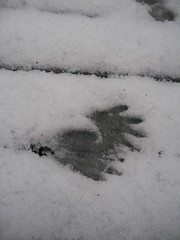Traces and Their Role in Learning
Had a pleasure to talk with Nancy on her work on technologies for communities. Some things are still hanging out in my head, so I guess I just write them here to move on. Open issues for research/thinking on communities (communities of practice; KM perspective). Definitions. Ton cites Marc Smith: I agree with both that there are no good definitions and I like 'collective action' as a term, but I think it doesn't work if you want to talk about specifics. It could include anything between a loosely coupled network, a community with shared language and practice or a project group with tight deliverables and deadlines. The boundaries between those are fluid, but they (at least in the extremes) are different in many respects (e.g. relational density, levels of trust, shared understanding, goal-orientedness, etc.) Bottom-up evolution vs. top-down control in supporting communities. See the discussion at Dave Snowden's blog. Personal vs. social in community tools. Most of the community tools are group-focused (although Nancy is right, it's getting more and more blurred). However, many of us are members of multiple communities and have to deal with different group tool configurations for all of them. Technology-wise I'd love to see more work on something like personal learnining environments (slides with more) for networking and collaboration: a toolset that would allow me to participate in different social spaces without learning yet another interface. Aggregation of digital traces and social effects of those. Digital traces we leave eventually get aggregated and fed back to the social spaces we participate in or to some members of those (think of a community moderator who has access to stats on your activity in a community). They change knowledge we have about each other and eventually change the dynamics of our relationships and interactions (think of gaming the ratings or effects of metrics to measure community things in a corporate context). This is going to be bigger and scarier (at least for those people like me :), so we need to know more about it.It is fun thinking with friends half a world away. And it is fun finding the traces of that thinking scattered on our blogs. (Thank goodness for Bloglines!) Lilia wrote...
I copied the whole post, because it was a beautiful example of the very digital traces Lilia talks about in her work. This is an idea that I think we need to weave into our Technologies for Communities report. It is what I'm sensing and grasping for when I think about networked collaboration (post later today).... let's shelve the word 'community' and use and study the term collective action instead. There are over 150 definitions of community by social scientists. If we (the social scientists) are not able to decide what it is, maybe everybody else should not be using the word either...
Now, part of me wants to comment on each of the bits from Lilia's post as well. I could have commented on her blog, but I'll throw them here instead. So bear with me. This is a random thinking blog post, not something finely edited. Or edited at all! (Thinking out loud with my friends again!) 1. I don't think we should shelve the word community, but I think we should use it more carefully and with intention. When we mean collective action, let's call it that. Community isn't always about collective action. Though it is usually about collective SOMETHING! I can't let it go. Is it the romantic in me? That said, I loved what Ton said about cowpaths! Lovely. Reminds me of the raccoon tracks in the snow from yesterday. Lilia, the racoons knew I was about to post about you and left me inspiration! Anyway, Lilia, I think your comments reflect the complexity of the issue. No one term is going to work.
1. I don't think we should shelve the word community, but I think we should use it more carefully and with intention. When we mean collective action, let's call it that. Community isn't always about collective action. Though it is usually about collective SOMETHING! I can't let it go. Is it the romantic in me? That said, I loved what Ton said about cowpaths! Lovely. Reminds me of the raccoon tracks in the snow from yesterday. Lilia, the racoons knew I was about to post about you and left me inspiration! Anyway, Lilia, I think your comments reflect the complexity of the issue. No one term is going to work.
2. Bottom up and top down control - I'm thrilled people are writing about power. The better we get at talking about it constructively, the more we can work with it. Constructively!
3. Person vs social. I'd like to suggest we remove the vs. and start looking at the fabric that is made up of the personal and the social tools. Because even tools designed for online groups are most often used individually. 'Lot more to say about this. 'Nuff for now!
4. And traces? Well, this post is a living example!

0 Comments:
Post a Comment
Links to this post:
Create a Link
<< Home